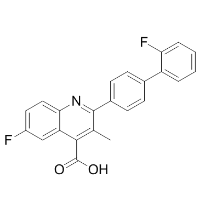
In vitro: Brequinar reduces virus progeny production by >90%, with EC50 of 17 nM. Brequinar (5 μM) also inhibits other orthopoxviruses, and blocks virus DNA replication. Brequinar does not affect virus early gene expression, but has a severe effect on the late stage of the virus cycle. Brequinar reduces the level of envelope protein production and the viral titer in a dose-dependent manner, with EC50 of 78 nM in the CFI assay. Brequinar (5 μM) inhibits viral RNA synthesis. Brequinar has antiviral effect, but the effect is reversed by pyrimidine. Brequinar-resistant viruses can be selected in cell culture. Brequinar (5 μM) suppresses the luciferase activities from both the WT and NS5 mutant replicons. Brequinar sodium effectively prevents the increase in PyNTP levels with an IC50 of 0.26 μM. Brequinar sodium effectively inhibits cell proliferation with an IC50 of 0.26 μM. Brequinar sodium inhibits autophosphorylation of p56lck with IC50 of 70 μM; inhibition is 39, 41, and 60% for 25, 50, and 100 μM Brequinar sodium, respectively. Brequinar sodium also inhibits the phosphorylation by p56lck of the exogenous substrate, histone 2B, with an IC50 of 70 μM; inhibition is 10, 43, 59, and 86% for 25, 50, 100, and 200 μM Brequinar sodium, respectively. Brequinar sodium inhibits autophosphorylation of p59fyn with an IC50 of 105 μM; inhibition is 0, 17, 48, and 65% for 25, 50, 100, and 200 μM Brequinar sodium, respectively. Brequinar sodium also inhibits the phosphorylation by p59fyn of histone 2B with an IC50 of 20 μM; inhibition is 26, 54, 79, 83, and 84% for 10, 25, 50, 100, and 200 μM Brequinar sodium, respectively.
In vivo: Brequinar sodium-treated (10-20 mg/kg/day) mice has a 31% reduction in percentage of packed cell volume compared with untreated BALB/c mice. Brequinar sodium reduces UTP and CTP levels in bone marrow cells by 30 and 25%, respectively. Brequinar sodium (10-20 mg/kg/day) in combination with uridine (1000-2000 mg/kg/day) prevents anemia, and the hematocrits remain at levels (61-63%) comparable with those of untreated controls.
| Cell Experiment | |
|---|---|
| Cell lines | BSC-40 cells |
| Preparation method | BSC-40 cells are seeded in 96-well plates in the presence of concentrations of Brequinar ranging from 0.01 μM to 75 μM for 24 h. Control cells are incubated with 0.1% DMSO. Neutral red is methanol/acetic acid-extracted from cells and is quantitated at an absorbance of 490 nm (A490). All measurements expressed the average of four independent assays. |
| Concentrations | 0.01 μM to 75 μM |
| Incubation time | 24 h |
| Animal Experiment | |
|---|---|
| Animal models | Mice |
| Formulation | 0.9% NaCl |
| Dosages | 100mg/kg |
| Administration | i.p. |
| Molecular Weight | 375.37 |
| Formula | C23H15F2NO2 |
| CAS Number | 96187-53-0 |
| Solubility (25°C) | 25 mg/mL in DMSO |
| Storage |
Powder -20°C 3 years ; 4°C 2 years In solvent -80°C 6 months ; -20°C 1 month |
| Species | Mouse | Rat | Rabbit | Guinea pig | Hamster | Dog |
| Weight (kg) | 0.02 | 0.15 | 1.8 | 0.4 | 0.08 | 10 |
| Body Surface Area (m2) | 0.007 | 0.025 | 0.15 | 0.05 | 0.02 | 0.5 |
| Km factor | 3 | 6 | 12 | 8 | 5 | 20 |
| Animal A (mg/kg) = Animal B (mg/kg) multiplied by | Animal B Km |
| Animal A Km |
For example, to modify the dose of Compound A used for a mouse (20 mg/kg) to a dose based on the BSA for a rat, multiply 20 mg/kg by the Km factor for a mouse and then divide by the Km factor for a rat. This calculation results in a rat equivalent dose for Compound A of 10 mg/kg.
| Related DHODH Products |
|---|
| DHODH-IN-13
DHODH-IN-13 is a hydroxyfurazan analog of A771726 and a dihydroorotic acid dehydrogenase (DHODH) inhibitor with an IC50 of 4.3 μM for hepatic DHODH in rats.DHODH-IN-13 can be used in rheumatoid arthritis-related studies. |
| DHODH-IN-12
DHODH-IN-12 is a Leflunomide derivative and a weak inhibitor of dihydroorotic acid dehydrogenase (DHODH), with a pKa of 5.07. |
| hDHODH-IN-5
hDHODH-IN-5 is a human dihydroorotic acid dehydrogenase (DHODH) inhibitor with an IC50 of 0.91 μM. hDHODH-IN-7 induces differentiation of acute myeloid leukemia cells. |
| DHODH-IN-8
DHODH-IN-8 is an inhibitor of human and Plasmodium falciparum dihydroorotic acid dehydrogenase (DHODH) with IC50s of 0.13 μM and 47.4 μM and Ki of 0.016 μM and 5.6 μM, respectively.DHODH-IN-8 exhibits antimalarial activity. |
| DHODH-IN-14
DHODH-IN-14 is a hydroxyfurazan analog of A771726 and a dihydroorotic acid dehydrogenase (DHODH) inhibitor with an IC50 of 0.49 μM for hepatic DHODH in rats.DHODH-IN-14 can be used in rheumatoid arthritis-related studies. |


Products are for research use only. Not for human use. We do not sell to patients.
© Copyright 2010-2023 AbMole BioScience. All Rights Reserved.
